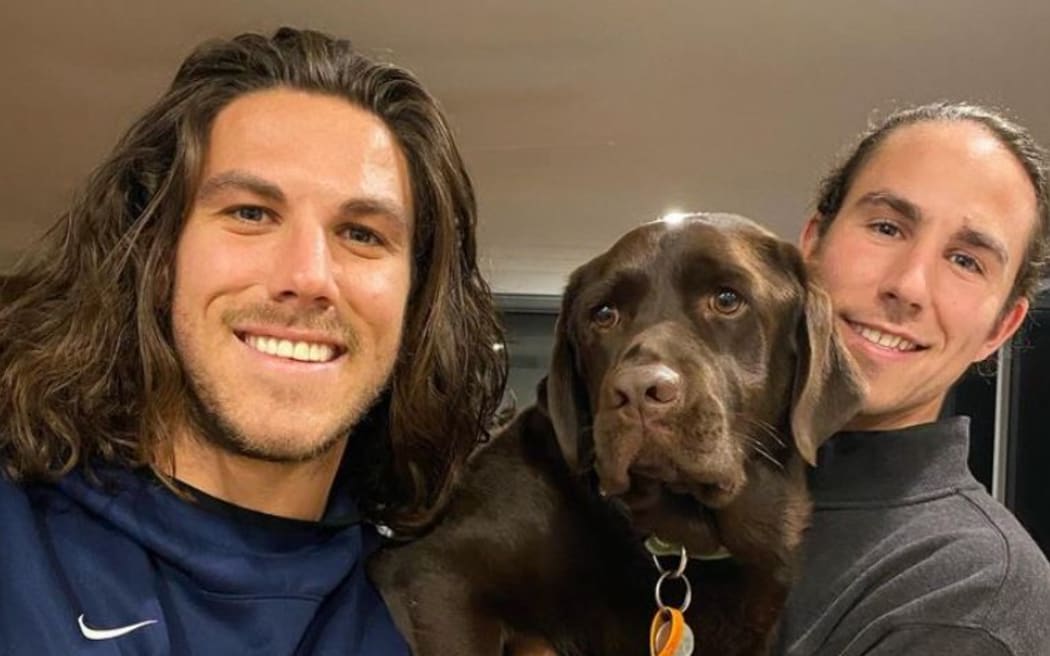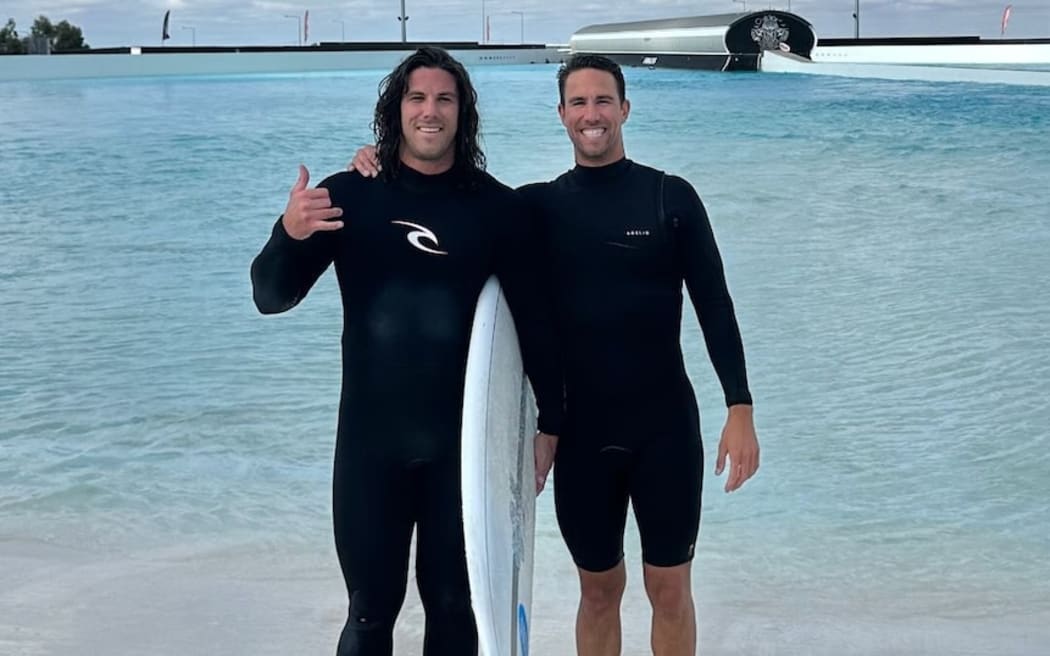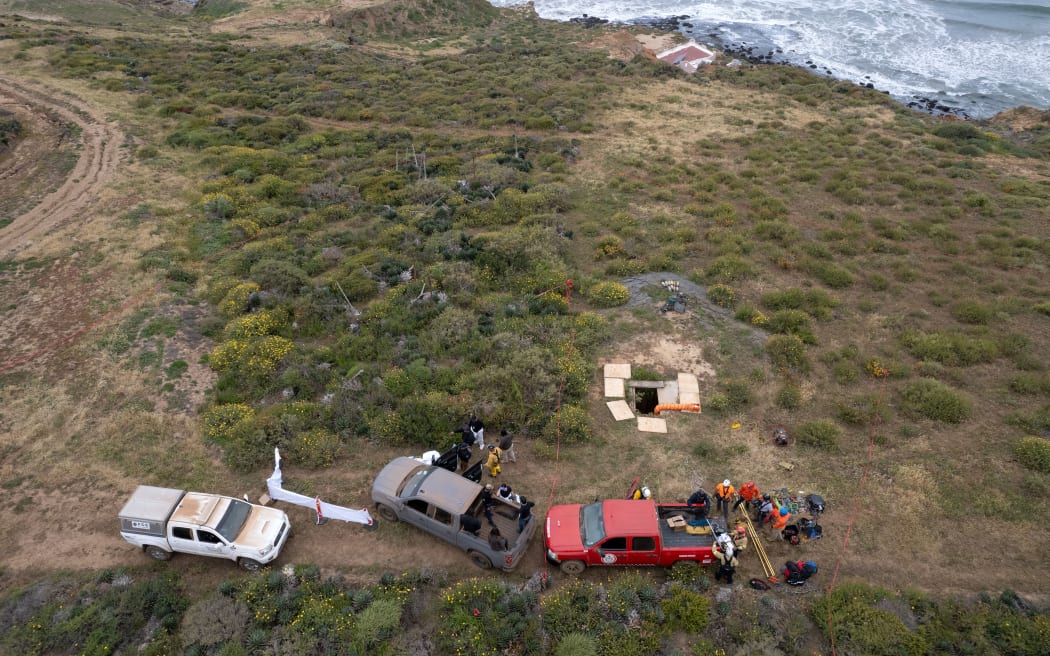By North America correspondent Carrington Clarke and Aline Corpus in Ensenada, Mexico and Phoebe Hosier for the ABC

Mexican authorities say they believe Jake and Callum Robinson were killed in a robbery gone wrong. Photo: Instagram/Supplied
We may never know exactly what happened to Jake and Callum Robinson and Carter Rhoad on those scrubby, remote cliffs in Baja California.
Mexican authorities say their primary theory is that it was a senseless, spontaneous crime - thieves trying to make off with the tyres on their ute.
Somehow, this relatively petty act escalated into the murder of three young men on a deserted patch of land.
The desperate search for the missing brothers and their friend ended with the discovery of their bodies inside a 15-metre-deep well.
But the nature of the killings, where they took place - in a known drug trafficking area - and the presence of a seemingly unconnected fourth body inside the well have led to major questions about whether Mexico's notorious cartels were involved.
The former director of the Ensenada Police Department, Jesus Luna Lezama, said the alleged motive given by Attorney-General Maria Elena Andrade Ramírez doesn't add up.
"My experience tells me that if you want to steal cars, you don't then commit more violent crimes," he told the ABC.
"They don't want to get caught."
Lezama is not currently involved in the case but spent 25 years working in the force before he retired and said the publicly available evidence suggests this wasn't just a random attack by low-level criminals.
"There was more than one person involved, the perpetrators brought weapons to the scene and they were motivated to move the bodies and dispose of them."
The attorney-general's team is likely to have access to large amounts of evidence that has not been released publicly, so it is impossible to conclude how they have come to their robbery-gone-wrong theory.
But Lezama is not alone in questioning whether organised crime actors played a role in the deaths of the Australian men.
This is what we know - and what we don't know - about the slaying of Jake, Callum and Carter.

Jake and Callum Robinson followed a familiar path carved by many visiting surfers. Photo: Supplied / Instagram
Men with the world at their feet
As investigators attempt to figure out what happened, entire communities are mourning the loss of the two brothers and their friend.
The three men were in the prime of their lives with so much on the horizon when they embarked on their trip to Mexico.
Carter was due to be married in August. His fiance was in Florida for her bachelorette with girlfriends only three weeks ago.
Jake, a doctor, was about to begin the next phase of his medical training at a hospital in Geelong.
His big brother Callum, once a professional lacrosse star, was focusing on his life beyond sports, working in California's tech industry.
"If you're not living on the edge, you're taking up too much room," Callum wrote in his bio on Instagram.
Some might say the trio's journey to the Baja California coast in their Chevy showed a collective willingness to take risks.
But while the region is considered to be rife with drug cartels who move vast amounts of drugs across the border into the American market, violent crimes against visiting foreigners are rare, according to authorities.
Jake, Callum and Carter followed a familiar path carved by many visiting surfers chasing Baja California's relatively untouched, pristine beaches.
And even though they decided to camp out at Punta San Jose, a remote and stunning beach with no cell phone reception, no-one expected they would be in danger.
"I did not think anything should happen to those big strong guys, right?" Rodrigo Leal Bravo from a local surf shop told the ABC this week.
Authorities in Baja California, aware that this tragic crime could dissuade other foreign tourists from the region, are keen to wrap this up quickly.
Disappearances are not uncommon in this part of the world, where drug cartels wield a terrifying amount of power and show no regard for human life.
But in their haste to close the case of the murdered surfers, Mexican authorities have left a lot of questions unanswered.
The man accused of killing three men for their tyres
Andrade Ramírez has been keen to paint the tragedy in Ensenada as a random crime.
The underlying message behind her updates appears to be that fates conspired to bring the group of surfers into the path of freewheeling thieves.
"They may have been looking for trucks," Ms Andrade Ramírez said at a press conference earlier this week.
"The perpetrators drove by and saw the foreigners' ute and tents, and wanted to steal their tyres."
A 23-year-old woman, her then-partner and his brother were detained last week by Mexican authorities in relation to the missing brothers and their American friend.
One of the men has since been charged with "forced disappearance" and a court on Thursday heard details of how Jesús Gerardo crossed the path of the three surfers.
At some point between late afternoon on April 27 and April 28, prosecutors allege that Jesus Gerardo discovered the three men and was motivated by a desire to steal from them.
He is accused of murdering them, each with a single gunshot to the head, before moving their bodies - possibly with the help of others - 6 or 7 kilometres to dispose of them in a well. A body unrelated with the case was also discovered in the same shaft.
At some point, prosecutors say he torched the campsite, seemingly in an attempt to cover his tracks.
He removed the tyres from the ute before putting them on his girlfriend's vehicle, which he was driving at the time.
Jesus Gerardo has yet to enter a plea in the case and the charges against him have not yet been upgraded to murder, but that is expected to happen in coming days.
His then-partner, turned key prosecution witness, told a courtroom on Thursday that he had told her "I killed them" before handing her a mobile phone and taking her outside to show her the new tyres on her car that had been allegedly stolen from the trio's vehicle.
Jesús Gerardo goes by the alias "el Kekas", a slang word that means "quesadillas" or cheese tortillas.
He has a long rap sheet, including a history of drug dealing, domestic violence and vehicle theft, Andrade Ramírez said.
But prosecutors believe other people were involved in the case.

Rescue workers, forensics, and prosecutors preparing to enter a waterhole where human remains were found near La Bocana Beach, in Ensenada, Mexico, on 3 May, 2024. Photo: AFP/ Guillermo Arias
Former detective suspects cartels may have played a role
While the court hearing shed further details on what happened that day, a swirl of questions remain, particularly over whether others were involved.
When asked about whether other factors could be at play on Monday, Andrade Ramírez said, "it is a possibility that they (criminals) know pretty well that zone, and they knew about the well and it is not ruled out that the fourth body is related to their activities".
People familiar with the Baja California region say the area is notorious for cartel activity, which is growing more ubiquitous and violent.
Its proximity to the American border makes it a target for both official and black market economies, the location enticing not only foreign tourists but major drug and human traffickers.
According to the US State Department, Baja California falls under the second-highest severity level, urging travellers to "reconsider travel" due to crime and kidnapping.
Several rival cartels are in operation in the area, including the Tijuana Cartel and the Jalisco Cartel, as well as two factions of the Sinaloa Cartel, the Mayo Zambada and the Chapitos.
Former US Marshal and deputy police chief Robert Almonte used to investigate cartel homicides and has worked undercover as a narcotic detective embedded within Mexican cartels.
He said, based on the few details that are known about the death of the three men, the behaviour fits a pattern of a "different type of criminal".
"I believe there's a good chance they were Mexican cartels, or at least associated with the Mexican cartels," he said.
"Sadly, I think no matter what happened, these young men were going to be killed anyway. Because that's how the Mexican cartels operate. They don't want any witnesses."
The scourge of Mexico's cartels
Tourism is critically important to Baja California, which received more than 30 million tourists last year.
The money these visitors bring in helps to keep a sizeable part of the state's population employed.
Politicians are aware of just how important this is for the local economy. They also know that violent cartel behaviour is likely to dissuade other tourists from making the same trip.
So they face a delicate balancing act in rooting out criminal syndicates, while also attempting to minimise their behaviour in an attempt to get the news off the front pages as quickly as possible.
Forced disappearances are common and have become a massive human rights issue in the country, with organisations calling for more to be done to protect victims.
The Mexican government estimates more than 111,000 people have "disappeared" since records began in 1962, though local groups insist that number is much higher.
Kevin Moreno is among countless others who have been "disappeared".
The young man went missing while working in a bar two years ago and his father, Gonzalo Moreno, believes a criminal gang called "Los Rusos" (the Russians) is responsible for his disappearance. The syndicate are part of the Sinaloa Cartel.
Since his son's disappearance, Moreno and his wife, Soraya Villarreal, have become outspoken advocates for victims' rights, despite the risks.
He says the situation in Baja California has deteriorated and organised crime groups from certain cartels "have taken a power far superior to what has been seen in recent years".
"Baja California, Mexico, is going through a very complex lapse of insecurity," he told the ABC.
Moreno says the current motive for the killing of Jake, Callum and Carter, which has been put forward by the state's attorney-general, is "hard to believe" and that what happened to the three men is "not uncommon in our state, nor are they isolated occurrences".
It is perhaps for this reason that the intense spotlight on the Robinson/Rhoad case, which has drawn in journalists from around the world, has not sat well with some locals in Baja California.
What about Mexico's 'disappeared'?
Many in the area have suffered similar tragedies to the Robinson and Rhoad families.
Loved ones have gone missing in the blink of an eye, leaving their families reeling.
Grief is further compounded by a lack of certainty about what happened and a failure to get any answers on who is responsible.
The cases of Mexico's disappeared have drawn scrutiny from journalists following the investigation into the three surfers.
While locals are grappling with their own feelings toward the treatment of the three men, Moreno is more hopeful that the deaths of foreigners might help put pressure on authorities to solve other crimes.
"I hope that the social pressure, outside our country, from countries like Australia, with the pressure of the families, help to achieve some justice for these young people," he said.
"I hope that by solving these cases, authorities might solve other cases, such as the fourth person who was found in that grave."
Some hope Mexico's upcoming presidential election - set to be the biggest in the nation's history - could turn the tide on political corruption and cartel violence.
When Mexicans head to the polls in June to elect the nation's first female president, security and crime are expected to be among the leading issues set to shape election results.
In the meantime, would-be visitors to Mexico may be drawing their own conclusions about travelling to the area.
The moderator of the Talk Baja internet forum, who has lived in the area for almost two decades, wrote in an editorial: "The reality is, the dangers of travelling to and camping in remote areas are outweighing the benefits."
- This story was first published on ABC News


